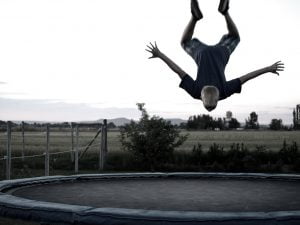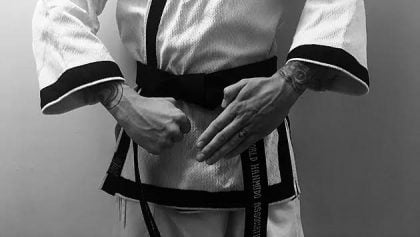Random coloured belts, jealousy and finding your emotional centre
There’s nothing like martial arts training to show you your garbage. Even in a dojo that cultivates respect and camaraderie, jealousy and pettiness can creep in.
Sometimes the reason is clear. Perhaps a new beginner is learning faster than you ever did. Perhaps you’re the sensei, but one of your senior students is better at engaging with the teenagers. Perhaps you envy the student who has been blessed with a stronger and more flexible body than you.
But sometimes, there is no reason – or at least not one that makes any logical sense.
I’ve been there, and it felt incredibly confusing at the time. Thanks to my sensei’s unexpected and unconventional response, things fell into place – and I learned four important lessons about martial arts training and life in general.
So if you’ve ever felt flummoxed by your own emotions, this story is for you…
Helen and me
I’ve been training in Aikido for many years, and a couple of years ago also took up Aikijujutsu. This story begins at a point where I also start training in Karate, at the same dojo where I train in Aikijujutsu. It’s a small and unconventional club, where dedication to learning the martial arts is paramount; and I feel very much at home there.
Another woman starts at the same time, and we quickly become good friends. I’ll call her Helen. We start off really happy and full of excitement.
After a few months however, Helen isn’t happy with the lessons. Our lessons are well-structured and intense, and very much focused on practising the basics over and over again. Neither of us has graded, although we probably know the syllabus for the first couple of grades. For me, wearing a white belt twice a week to Karate is no big deal and I’m actually enjoying being a beginner. But Helen is hungry to learn as fast as possible, and becoming increasingly fed-up with the slow pace. She craves a large, lively dojo, and the feeling of being pushed up the grades.
And some of her doubts start to rub off onto me.
Is the grass really greener on the other side? Are we missing out on something that other, larger and more mainstream clubs are offering. Are we being held back in some way while others are learning more – and faster . . . ?
Exploring other options

So one night Helen comes back to my place after training; and we stay up late, carefully assessing the website of literally every Karate club within reach. We finally settle on a dojo about ten miles away which describes itself as “traditional”, and decide to go and explore it. So we both send apologies to our sensei for that Friday, and guiltily head over to the other dojo.
At first it’s all very nice. The club has a huge membership, including a load of black belts and brown belts, and everyone is friendly. The sensei is also very welcoming. He tells Helen and me that he’s some amazing dan grade, and far better than any other teacher we will ever find; as he has trained and graded in Japan!, and he teaches authentic Karate – unlike other clubs.
Based on this conversation, I instantly know that I don’t want to learn from this sensei. But Helen is already smitten.
The class starts, but the sensei doesn’t teach. He watches from the side of the mat as two young black belts lead the lesson.
And the pace is absolutely bonkers. After spending four months carefully practising and polishing the purest basics of Karate, we’re suddenly practising what feels like a million different things all at once.
As we speed up and down the room in rows, doing countless different kicks, punches and blocks at top speed; and learning six – SIX! – kata in one evening, I feel both out of my depth, and also frustrated. In my own dojo, Sensei corrects every little nuance, in painstaking detail, and has no problem with telling you the same point a thousand times if needed; week after week.
And that’s fine by me. After all, Funakoshi Sensei himself (the founder of Shotokan Karate) talks in his autobiography about practising a single kata for weeks at a time or sometimes even months. And Bruce Lee famously said:
I fear not the man who has practiced 10,000 kicks once, but I fear the man who has practiced one kick 10,000 times.
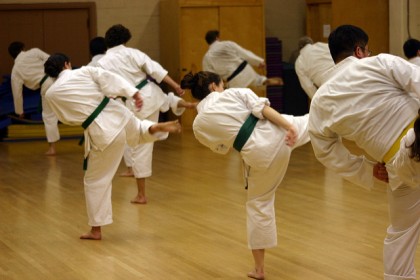
But in this class, I feel like I’m just waving my hands and feet randomly about, and literally don’t know if anything I do is right or wrong – and it feels really stressful. And there’s no sign whatsoever of any impact work. As far as I can see, it’s more like some kind of shouty, aggressive aerobics class than martial arts training.
After class, people make a huge fuss of us. A couple of the black belts tell us that we’re both really talented, and will definitely be allowed to skip out the lower grades and whizz up through the belts.
Helen is glowing all the way home. She says: “this is exactly what I need; this is a proper class; the sensei is amazing, and so on.”.
I return one more time, just to put my own mind at rest that I’ve made the right decision. The lesson is just as poor in my view; and we “learn” a couple more kata on top of repeating the ones from Friday, which feels crazy. By now I just want to go “home” and pick up where I left off.
Back to where I started…
So I’ve tried it, but it wasn’t right for me. The next week, I retreat back to my own dojo, while Helen stops coming to our lessons, and throws herself into her new regime. I discuss my adventures with Sensei, and we agree that it’s good that Helen and I are both so happy, and enjoying our different respective paths.
A couple of days later, Helen texts:
[…] I feel I’ve learned more in 3 sessions than the whole time with [our sensei]. He’s lovely and takes a lot of care in his teaching, but for me, it’s just too slow […].
From several other things she says over the next few weeks, I realise that she thinks poorly of my dojo; and believes the reason I chose to stay is because I’m not good enough to learn at the same fast pace as her. And sometimes I feel secure enough to take this with a pinch of salt – but other times I worry: is she correct?
Five weeks later, Helen texts me a picture of her new green belt. She has been allowed to skip 9th and 8th kyuu, and double-graded for seventh and sixth kyuu. She coyly says that she is feeling flattered at this outcome, which is based on her ability and hard work.
Of course I know this is not a threat to me in any way whatsoever; but I still can’t help feeling upset and insecure at her boasting. I still haven’t taken any gradings in Karate yet.
A difficult evening – Helen visits
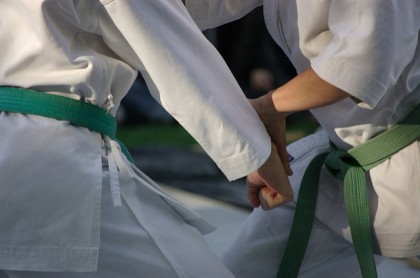
Six weeks later, one Friday night, Helen calls in at my dojo to say hi, on her way home after her own training finishes. Our class has finished too, and a few of us are just chatting and messing around. Helen turns up still wearing her gi and green belt. She grabs a senior student and demonstrates Bassai Dai (a brown belt kata) at top speed to him; and all kinds of other advanced kata that she’s been learning.
She tells us all that she’s just about to double grade for 5th and 4th kyuu, which I already knew about.
I just feel angry, insecure and jealous; and uncharacteristically conscious and ashamed of my white belt. The weird thing is, I actually couldn’t care less about grading. I’m already a black belt anyway (in Aikido) and all I want from the Karate is to learn it.
But the realisation that Helen is about to move up again, and will now be six grades ahead of me in Karate, within the space of just three months since we went our separate ways, just really gets to me.
And yes I know it’s ridiculous, and that her dojo is not what I want, and everything else. I know that I’m learning the basics rigorously from a wonderful teacher, and that I have no interest at all in learning at her club. But I’m only human; and her constant boasting and lack of respect for my own learning journey over the last few weeks seems to have worn me down.
Differences of opinion
Meanwhile, in the informal after-class messing about, my sensei is showing us a bunkai (application) where one of the gedan barai blocks in our first kata becomes a throw. I love all the bunkai, as this is where Karate starts to resemble the aiki I know and love; with locks and throws and real, dynamic interaction with your opponent.
Helen whispers to me: “I think he’s got that wrong! My sensei says that the bunkai for gedan barai is when someone’s trying to kick you, and you block the kick!”
I don’t even attempt to explain to her that there are different types of bunkai, because I know she won’t get it. The one she has been told about is a very basic, “what you see is what you get” application. The one that my sensei is teaching is a more creative, “hidden” application.
But Helen then decides to also politely advise my sensei that she thinks the bunkai he’s showing is wrong.
He says in a nice voice: “No this is right but it’s not the same as what you’ve been told; because Kai likes to learn some of the advanced things, while you prefer to focus on the basics. But that’s absolutely fine; different people are interested in different things.”.
I feel very grateful to him for standing up to her like that, and for challenging her assumption that she is so much further “ahead” than me.
Receiving my first coloured belt for Karate

However, after Helen leaves the dojo that night, I’m feeling incredibly shaken and upset by her disruptive visit. I unreasonably turn on my sensei and say: “It’s not fair! I’ve been working just as hard as Helen; but now she’s all full of belts and I’ve got nothing, because you don’t ever grade me.”.
Sensei looks at me in amusement. He says kindly: “Do you want a coloured belt then?”
Still upset, I say, “yes, I do!”.
He hunts around in his training bag and fishes out a random belt. He says: “Would you like this one?”.
I literally have no option but to laugh. I have no idea what kyuu grade it represents, but the colour is lovely; like a jewel. So I accept it with a smile and put it into my bag, realising that I’ve been very stupid to let myself get sucked into a really meaningless stress about belts, which I should have risen well above by now.
Reflections
Over the weekend, I have time to reflect: Why did I feel so jealous of Helen?
If I had switched to her club, I would probably be moving through the belts at the same pace as her – but I didn’t actually want to.
Do I want a green belt (or higher) in non-contact Karate taught at breakneck speed? No – not for a moment.
Do I want to give up the increased physical strength gained from six months of punching, kicking and blocking; and the rich emotional experience of practising basic sparring – and exchange these for knowing the superficial roadmaps of loads of kata? No, I don’t.
I want to stay right where I am; where we practise everything a million times, and treasure depth, exploration and discovery. I want to learn secrets! Above all I want to learn to fight. Helen doesn’t have access to any of these gifts, as her priorities are so different. So why do I feel so resentful of her green belt, of all things?
And I realise what the answer is – why I’ve been so hijacked by jealousy. When I’m at my dojo, it’s like being a safe little bubble, where I can follow my heart and pretty much disregard a lot of normal social conventions.
My sensei couldn’t care less about belts, although he does award them to the kids when prompted, as that’s what they and their parents like. And he also grades adults if and when it means a lot to them. (So to be fair, I could have graded by now if I’d actually cared enough to ask).
And within this eccentric, protected little world, I’m doing well; and am making steady progress with learning the right things.
But Helen has broken into this bubble and reminded me that there’s a whole enormous world out there which judges things in a completely different way. For 99.9% of this world, her Karate journey and her achievements over the last few months would surely be considered far greater than mine – due to that all-important green belt – soon to be a purple belt – and that’s what hurts and makes me feel jealous and so vulnerable.
It’s also very clear that she herself believes she is doing far better than me, and can’t hide her feelings of superiority. But when tested like this, I just don’t always have enough certainty that I’m right, to weather her attack.
Helen also seems to believe that her Karate is morally superior to mine, insofar as it’s apparently more civil and refined. She’s already said a couple of times: “I learn it purely as an art. I’m just not interested in the whole kicking and punching people side of it; that’s really not my thing.” And there are so many things I could say about the sublime morality of learning a genuine martial art – but I don’t feel like arguing with someone who won’t hear or understand me; and in any case I can’t find the right words.
Lessons learned
So to round up, here are the four things I learned from this episode:
1. Develop the inner strength to walk your own path, even if it goes against the grain

Firstly, we need to be absolutely certain of our own personal values and goals, and have confidence that our own chosen path is right for us. And not let other people tell us we’re wrong – even if their view is the socially “normal” view, and they are in the vast majority.
As Yamamoto Tsunetomo put it, in the Hagakure:
Always listen to yourself. It is better to be wrong than simply to follow convention. If you are wrong – no matter. You have learned something and you will grow stronger. If you are right, you have taken another step towards a fulfilling life.
2. The dojo can be a very special place – but the real world doesn’t go away

Secondly, finding a dojo which lets you challenge and play with subverting social norms can be a rare blessing. But the “real world” is still always there, and you need to maintain the inner strength and balance to live in it gracefully and without losing your centre.
The blogger Matthew Apsokardu recently posted a brilliant story that illustrates this point: A Karate Man Would Not.
And O Sensei, the founder of Aikido advised his students to actively welcome hardship, setbacks, and challenges in their day-to-day life, as an essential part of their training.
3. Accept that opinions differ and save your breath

Thirdly, there are some situations where you just can’t explain your own point of view to someone else, and sometimes you’re better off not wasting your energy. I did try to explain my views of Karate and martial arts to Helen a few times, but with no success. It was a powerful lesson to me, to realise that in my world she is wrong and I am right; but in her world I am wrong and she is right.
Plato illustrates this in his Allegory of the Cave, where one man escapes from the cave and discovers the real world outside it. He then returns, to try to persuade the others to escape into the sunlight. But his story sounds so fantastic, that he’s unable to get anyone to listen or believe him.
4. Martial arts training can expose us to completely unexpected views of the world
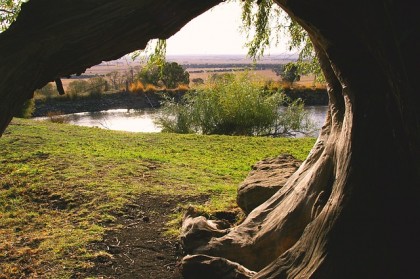
And finally, in the world of the martial arts . . . all is not always as it seems from the outside! A good example would be when people who don’t train describe what we do as “beating each other up”.
Another example is the discussion alluded to in the story above on the rights and wrongs and subtleties of karate bunkai.
And the importance often placed on coloured belts in the martial arts is a brilliant example of things not always being quite as they seem – with other exciting and liberating ways of knowing and being, sometimes lurking seductively below the surface – for those who care to look…



![Training in Martial Arts as a Dwarf – Larry McDonnell [Interview]](https://www.wayofninja.com/wp-content/uploads/2016/09/larry-featured-678-420x236.jpg)
